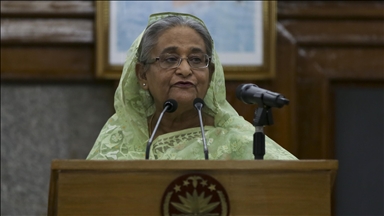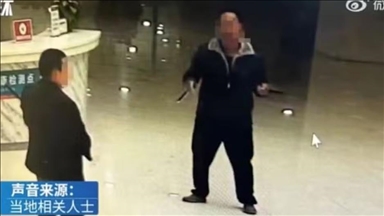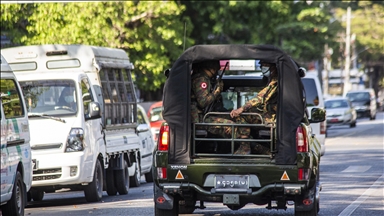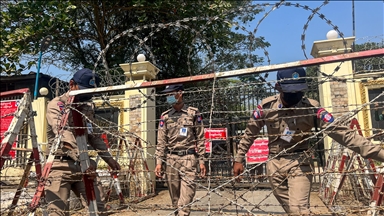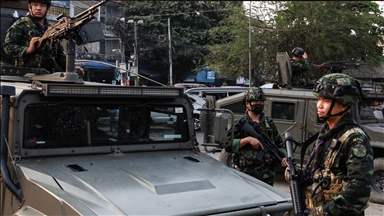Myanmar urged to ensure aid reaches Rakhine
Rights group says officials citing security operations to deny access to area where violence has displaced Rohingya, others
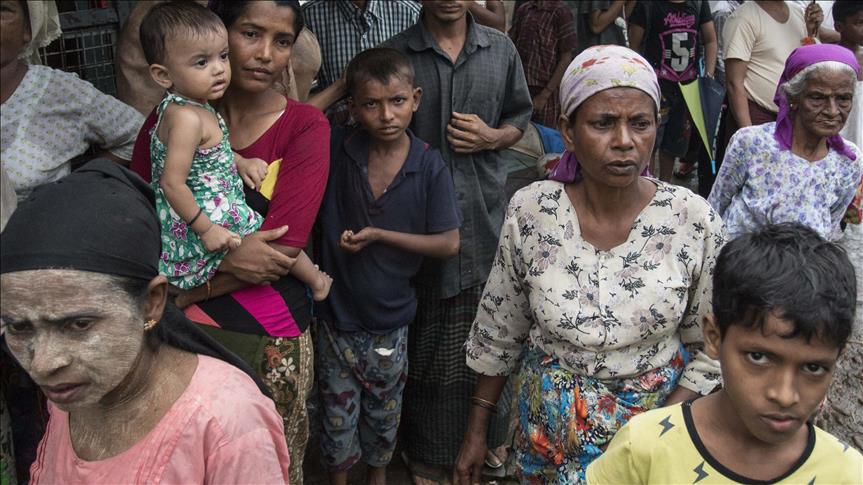
Yangon
By Kyaw Ye Lynn
YANGON, Myanmar
An international human rights group has called on Myanmar’s government and military to ensure humanitarian aid can reach vulnerable populations in Rakhine State where ongoing operations have blocked off the troubled region for more than a week.
Troops have poured into Maungdaw and Buthidaung townships near the Bangladesh border since Oct. 9 when fatal attacks on police station outposts killed nine officers and dozens of weapons and thousands of rounds of ammunition were stolen.
Since then authorities have blocked all aid deliveries to Maungdaw -- which like Buthidaung is predominantly occupied by the country's stateless Rohingya Muslim population -- and aid agencies have not been able to conduct a needs assessment, Human Rights Watch (HRW) said Friday.
“We have asked [for access] from township level to Union level,” a World Food Programme (WFP) partnerships officer was quoted as saying in the HRW statement.
“The official explanation [for being denied access] is that security operations are ongoing.”
WFP told HRW that while the government has recently permitted the resumption of food assistance to 37,000 people in Buthiduang, 50,000 people remain without food aid in Maungdaw.
The blocking of aid had worsened the humanitarian situation in the area where recent violence has displaced some 3,000 ethnic Rakhine people and as many as 15,000 Rohingya, HRW said.
“Recent violence in northern Rakhine State has led the army to deny access to aid agencies that provide essential health care and food to people at grave risk,” said Brad Adams, HRW’s Asia director.
“The Rohingya and others have been especially vulnerable since the ethnic cleansing campaign in 2012, and many rely on humanitarian aid to survive,” he added.
Since the Oct. 9 attacks, at least 43 people -- nine police officers, four soldiers and 29 suspected attackers (among them the two women) -- have been killed, or have died.
Last week, Myanmar’s government said the Oct. 9 raids were conducted by the Aqa Mul Mujahidin organization, which it described as being affiliated with the Rohingya Solidarity Organization (RSO), a shadowy extremist group that takes its name from the Rohingya.
With police and soldiers hunting for those responsible for the bloody attacks, members of both the Rohingya and Rakhine communities have fled their homes in fear.
Rohingya advocacy groups have expressed concerns over what they claim is a continued crackdown in the area, with global groups releasing a statement Sunday claiming security forces have been indiscriminately killing Rohingya and torching and plundering their homes and villages, under the pretext of looking for the attackers.
In the HRW statement, Adams stressed that Myanmar’s government “has a responsibility to search for and arrest those who attacked the border posts”.
“But it is required to do so in a manner that respects human rights, ensures that the area’s people get the aid they need, and allows journalists and rights monitors into the area.”
A 74-year-old Rohingya man, originally a resident of Warpaik village who is now sheltering in Kyetyoepyin after his home was destroyed, told Anadolu Agency on Friday that there is no one to help them now.
“Rakhine people are getting help from their community, but no one is helping us here,” he said by phone on condition of anonymity for fear of reprisal. “We are also restricted from moving to other villages.”
According to a media report Wednesday, displaced Rakhine ethnic people who have been sheltered in Maungdaw said they have not received any offer from United Nations agencies and NGOs for humanitarian assistance.
A member of a community-based organization helping around 300 people sheltered in a monastery in Maungdaw has accused UN agencies and NGOs of ignoring the needs of Rakhine people.
“We, Rakhine people, are in trouble. But no UN agency or NGO wants to help us,” Aung Kyaw Min was quoted as saying by the Voice newspaper.
“We are not going to accept their help even if they offer it to us."
A board appearing “We don’t need any support from UN and NGOs” was put at the entrance of the monastery, the report said.
Anadolu Agency website contains only a portion of the news stories offered to subscribers in the AA News Broadcasting System (HAS), and in summarized form. Please contact us for subscription options.


